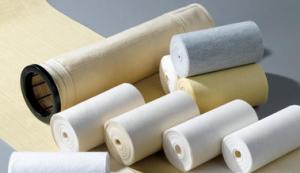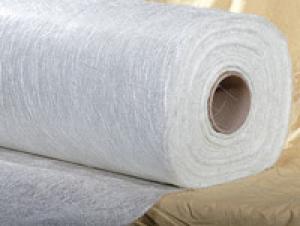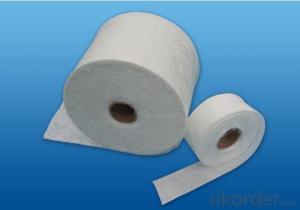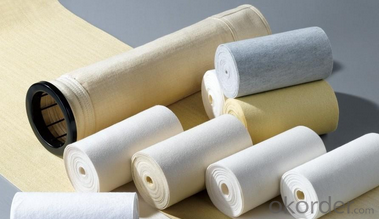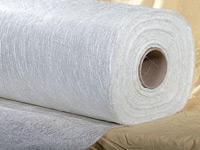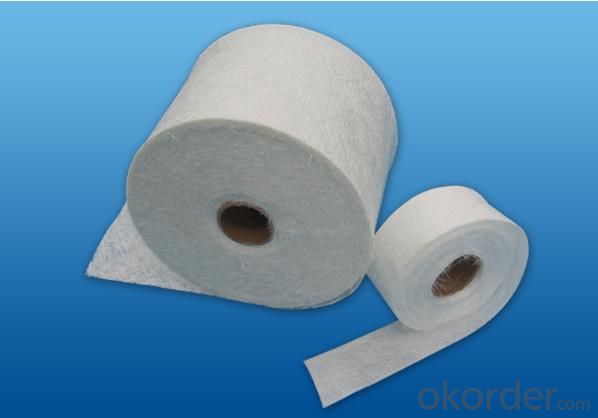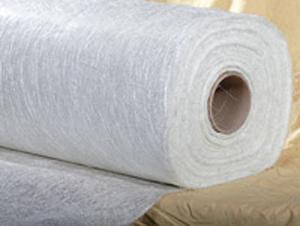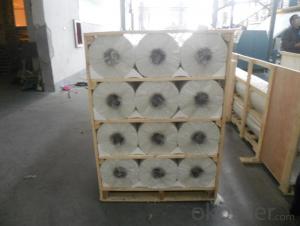Fiberglass Mat Tissue 300g Stitched Mat
OKorder Service Pledge
OKorder Financial Service
You Might Also Like
Structure of FIBERGLASS STITCHED MAT Description
The stitched mat is made of chopped strand which randomly dispersed and be stitched together by polyester thread. The width is available from 150-2400mm.Density of mat generally is 300-600g/m2.
The product is compatible with Polyester resin, vinyl ester resin, and epoxy resin.
Stitched mat is mostly primarily in pultrusion, RTM, filament winding, compression molding and hand lay up processes.
It is widely used in pipe lining, pultrusion section, storage tanks, FRP boat, insulation panel etc.
Main Features of FIBERGLASS STITCHED MAT
◎ Uniform thickness, good wet tensile strength retention.
◎ Good mould-ability, good drapability and easy operation.
◎ Good wet out speed and high efficiency in production.
FIBERGLASS STITCHED MAT Images
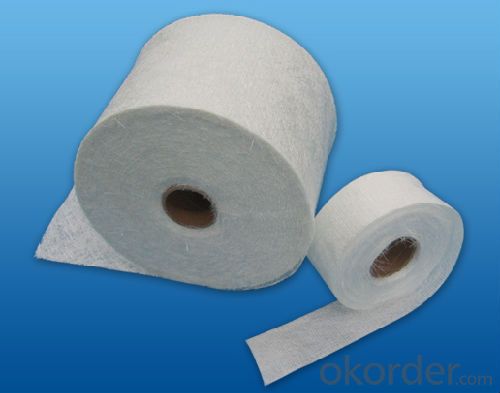
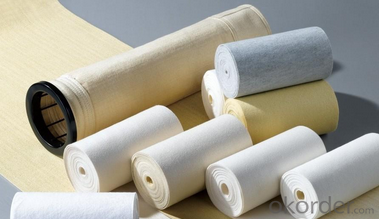
FIBERGLASS STITCHED MAT Specification:
Code | Density(g/m2) | Chopping layer density g/m2 | Width mm |
EMK225 | 225 | 225 | 150~2600 |
EMK250 | 250 | 250 | 150~2600 |
EMK300 | 300 | 300 | 150~2600 |
EMK450 | 450 | 450 | 150~2600 |
EMK600 | 600 | 600 | 150~2600 |
FAQ of FIBERGLASS STITCHED MAT
1. Why Choose us?
CNBM is a stated own company, provide the guarantee for the best quality, best service and safety business.
2. How will we guarantee the quality?
a, ISO 9001-2008 quality control system;
b, Strict and regular quality control in production;
c, Inspeciation when loading into container before shippment;
d, Sample stock for one year for quality tracing and record.
3. What is your MOQ?
Our MOQ is one pallet.
4. Can you provide sample?
Yes, samples are in stock. we can offer free sample for you.
5. Payment terms?
We can accept L/C, T/T etc.
6. Do you offer OEM service?
Yes, we can print customers’ logo on the packaging;
And the size and specification can be produced and design according to your demand.
- Q: What is the expected lifespan of fiberglass mat tissue in power generation applications?
- The expected lifespan of fiberglass mat tissue in power generation applications can vary depending on various factors such as the specific application, environmental conditions, and maintenance practices. However, fiberglass mat tissue is known for its durability and longevity, making it a popular choice for power generation applications. In general, fiberglass mat tissue can have an estimated lifespan of 20 to 30 years in power generation applications. This is due to its excellent resistance to corrosion, heat, and chemicals, which are commonly encountered in power generation facilities. Fiberglass mat tissue is also capable of withstanding high mechanical stress and can retain its structural integrity over a long period of time. However, it is important to note that the lifespan can be influenced by factors such as exposure to extreme temperatures, humidity, and chemicals, as well as the frequency and quality of maintenance and inspections. Regular inspections and proper maintenance can significantly extend the lifespan of fiberglass mat tissue in power generation applications. It is recommended to consult with manufacturers and industry experts to determine the specific expected lifespan of fiberglass mat tissue based on the particular power generation application and operating conditions.
- Q: Can fiberglass mat tissue be used for pipe insulation?
- Typically, pipe insulation does not involve the use of fiberglass mat tissue. Fiberglass mat tissue is a thin substance commonly utilized for reinforcement in different industries, rather than for thermal insulation or preventing heat loss in pipes. When it comes to insulating pipes, materials like foam, mineral wool, or fiberglass pipe insulation are more commonly employed. These materials are specifically designed to offer thermal insulation and safeguard pipes against heat loss, condensation, and freezing.
- Q: Are there any environmental considerations when using fiberglass mat tissue?
- Yes, there are several environmental considerations when using fiberglass mat tissue. Firstly, the production of fiberglass mat tissue involves the extraction and processing of raw materials, which can have a negative impact on ecosystems and contribute to air and water pollution. Additionally, fiberglass mat tissue is not biodegradable and can contribute to landfill waste if not properly disposed of. Furthermore, the manufacturing process of fiberglass mat tissue usually requires significant energy consumption, which can contribute to greenhouse gas emissions and climate change. Therefore, it is important to consider and implement sustainable practices when using fiberglass mat tissue to minimize its environmental impact.
- Q: How is fiberglass mat tissue used in the construction industry?
- Various applications in the construction industry make fiberglass mat tissue widely used. This material consists of thin strands of glass fibers bonded together with a resin, providing properties suitable for construction purposes. Roofing materials often utilize fiberglass mat tissue as a reinforcement layer in shingles or sheets. It enhances the roof's strength and durability, making it more resistant to weather elements like wind, rain, and hail. It also prevents cracking and splitting, extending the lifespan of the roofing material. Fiberglass mat tissue has another application in the construction industry, specifically in the production of composite materials. It serves as a reinforcement layer in composite panels and boards, enhancing their strength and stiffness. Its lightweight nature makes it ideal for building materials that require both strength and reduced weight. In the construction of walls and ceilings, fiberglass mat tissue can be applied between the gypsum board and insulation material. This provides additional strength and impact resistance, preventing cracks and damage to the building's structure. Additionally, fiberglass mat tissue finds use in the manufacturing of pipes and tanks. It reinforces fiberglass-reinforced plastic (FRP) pipes and tanks, adding strength and rigidity. This makes it suitable for various industrial applications, including chemical processing, wastewater treatment, and the oil and gas industries. In summary, fiberglass mat tissue is widely used in the construction industry due to its strength, durability, and lightweight properties. It is applied in roofing materials, composite panels, walls, ceilings, pipes, and tanks, among other applications. Construction professionals prefer it for its versatility and ability to enhance the structural integrity of various building components.
- Q: Does fiberglass mat tissue require any special surface bonding agents?
- Yes, fiberglass mat tissue often requires special surface bonding agents to ensure proper adhesion and bonding with the substrate. These agents help improve the overall strength and durability of the fiberglass mat tissue when applied to surfaces such as walls, floors, or other structures.
- Q: Can fiberglass mat tissue be used for swimming pool construction?
- Yes, fiberglass mat tissue can be used for swimming pool construction. It is commonly used as a reinforcement material to provide strength and durability to the pool structure.
- Q: Is fiberglass mat tissue suitable for electrical insulation applications?
- Yes, fiberglass mat tissue is suitable for electrical insulation applications. Fiberglass mat tissue is made from glass fibers that are bonded together with a resin, creating a strong and durable material. It has excellent electrical insulation properties, such as high dielectric strength and low electrical conductivity. This makes it ideal for applications where electrical insulation is required, such as in transformers, motors, and electrical switchgear. Additionally, fiberglass mat tissue is also resistant to moisture, chemicals, and heat, further enhancing its suitability for electrical insulation applications.
- Q: What is the flexibility of fiberglass mat tissue?
- The flexibility of fiberglass mat tissue refers to its ability to bend, conform, or mold to different shapes or surfaces without breaking or losing its structural integrity. The unique properties of fiberglass, such as its high strength-to-weight ratio and dimensional stability, allow the mat tissue to be flexible while still maintaining its strength and durability. This flexibility makes fiberglass mat tissue a versatile material that can be used in a wide range of applications, including automotive parts, construction materials, and boat manufacturing. Additionally, the flexibility of fiberglass mat tissue enables it to be easily cut, shaped, or layered to meet specific design requirements or fit into complex or curved surfaces.
- Q: Can fiberglass mat tissue be used for insulating crawl spaces?
- Yes, fiberglass mat tissue can be used for insulating crawl spaces. Fiberglass mat tissue is a versatile and commonly used material for insulation purposes. It is lightweight, flexible, and easy to install, making it suitable for crawl spaces which often have limited access and tight corners. Fiberglass mat tissue is also resistant to moisture, mold, and pests, making it an ideal choice for crawl spaces which are prone to these issues. Additionally, it provides excellent thermal insulation properties, helping to maintain a consistent temperature and energy efficiency within the crawl space. Overall, fiberglass mat tissue is a reliable and effective option for insulating crawl spaces.
- Q: What is the lifespan of fiberglass mat tissue?
- The longevity of fiberglass mat tissue can differ based on a range of elements, including material quality, exposure conditions, and maintenance level. Nevertheless, fiberglass mat tissue is generally recognized for its resilience and extended lifespan. By ensuring correct installation and consistent upkeep, fiberglass mat tissue can endure for numerous decades. Its resistance to corrosion, moisture, and UV radiation further contributes to its longevity. Furthermore, fiberglass mat tissue is frequently employed in roofing, insulation, and reinforcement applications, engineered to withstand challenging environments and deliver enduring effectiveness.
Send your message to us
Fiberglass Mat Tissue 300g Stitched Mat
OKorder Service Pledge
OKorder Financial Service
Similar products
Hot products
Hot Searches
Related keywords
